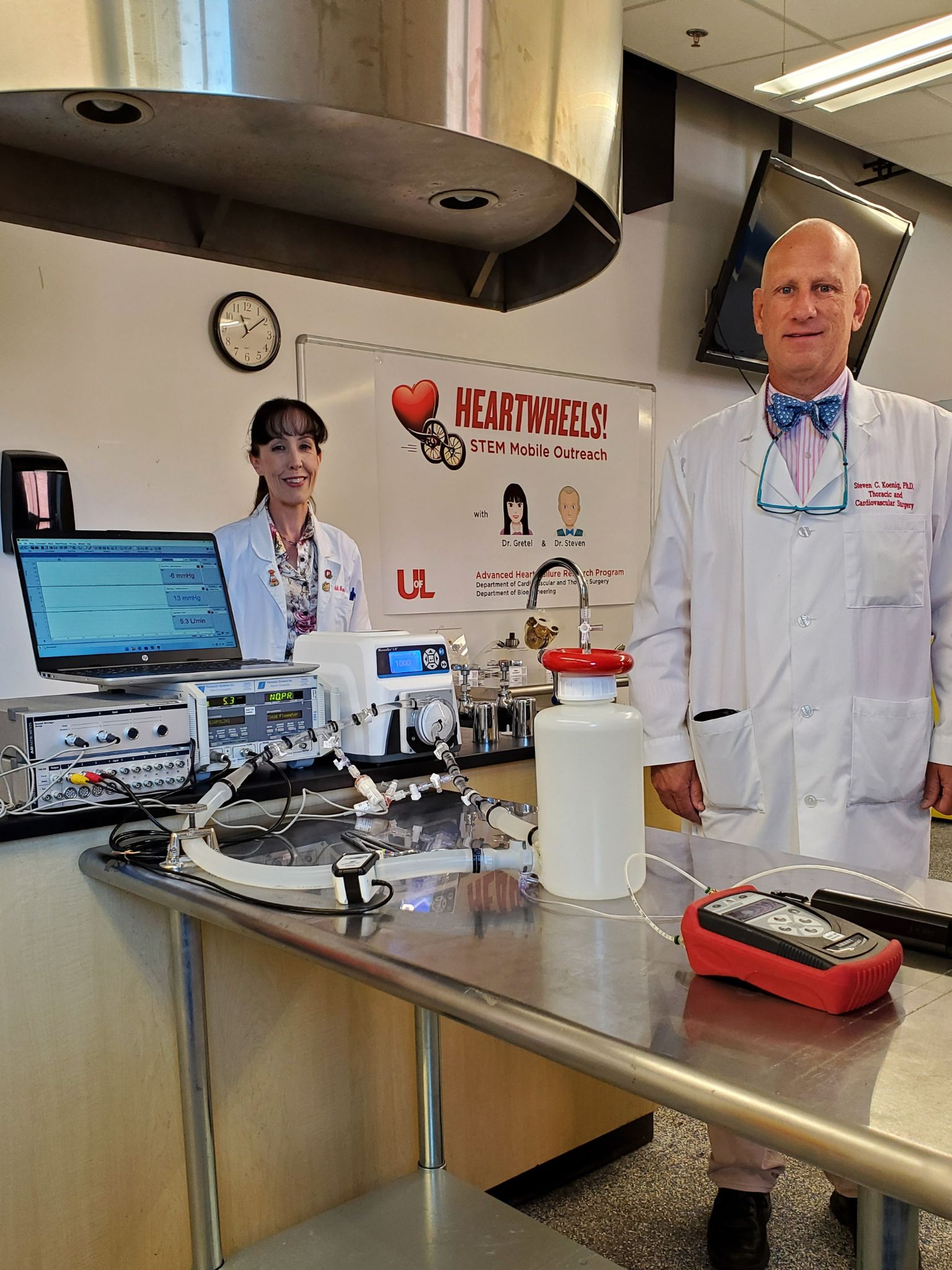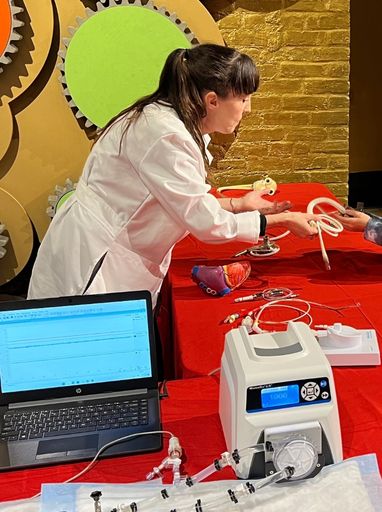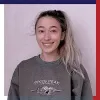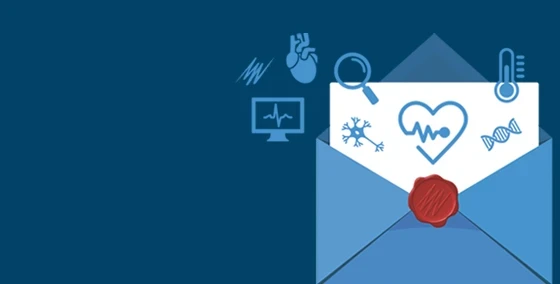Dr. Gretel Monreal and Dr. Steven Koenig make it their mission to provide students with hands-on learning experiences outside the classroom.
"So many people have taken us under their wing or helped us over the years, or showed us and inspired us...It's really important, you can't sit and wait for somebody else to do it. We are living the dream right now, so we thought, 'Why not share it with other people?'" - Dr. Steven Koenig
As full-time faculty at the University of Louisville and researchers working at the institute's Advanced Heart Failure Research Program, you may think that Dr. Gretel Monreal and Dr. Steven Koenig have their hands full already. But their work doesn't end there, as they have been busy in their mission to give back to the community around them and share unforgettable experiences with the next generation of scientists.
We had the opportunity to speak with Gretel and Steven about the incredible outreach work they are performing and how their program, which supports students to learn about the heart, came to be.
The formation of HeartWheels!
The Advanced Heart Failure Program at the University of Louisville gained international recognition for the program’s ability to conduct preclinical device testing following its role in the testing and clinical implantation of the AbioCor artificial heart, developed by AbioMed. The program has accomplished a great deal since it was formed in 2007, helping to advance mechanical circulatory devices that will help the nearly 6.5 million Americans over the age of 20 who have heart failure.
Dr. Monreal and Dr. Koenig’s commitment to fostering the next generation of scientists started with this Heart Failure program, where they have regularly opened up the doors of their labs for students. “For years now, we’ve invited student groups from the community to come and spend the day in our laboratory,” Gretel explains. It is important to these educators to allow students to visualize and get hands-on with the various testing devices and equipment set-ups. Groups of students even have the opportunity to handle thawed-out pig hearts. With their gloves on and knives out, they can dissect the hearts and get “silly and messy together”; a great time for the students and a chance to nurture their investigative instincts.
"We’ve been doing that for years and years. Then the pandemic hit. Suddenly field trips came to a stop, school came to a stop, group events came to a stop. Steven and I thought ‘This is a horrible thing,’ because we enjoy doing this so much for the students. So then we thought, maybe we can somehow take our lab out to them.”
Dedicated to continuing to provide students with a chance to get that hands-on learning experience outside of the classroom, Gretel and Steven formed the HeartWheels! STEM Mobile Outreach Program.
"We’ve created this hands-on educational curriculum that we can take out to the Kentucky Science Center. We set up there and then those student groups can come to a neutral site. The events are voluntary, fun, and the students want to be there since it’s like being on a field trip out of school. They aren't getting graded or evaluated, it’s interactive, and they can be silly. So they spend time with us at those sites, and in essence get to see everything they would have seen had they been bussed to our laboratory!”
By alleviating the pressure of assessment, these student groups simply get to focus on honing their intuitive skills and enjoying the nature of scientific investigation.
Opening the door of opportunity
What inspires these two researchers to go to such incredible lengths to give back to the community?
Gretel and Steven both noted how their refusal to abandon these students after the pandemic hit was because they knew just how important these early experiences are for students. Steven explains how critical it is to "give them the chance to put on the gloves and put on the lab coat" and for them to "not be afraid" of getting hands-on. The transition from tentativeness to comfortable confidence that they see in the students they serve is actually their favorite part of this outreach mission.
“You know, the first time they pull out the heart, they kind of poke it with a little finger to make sure it's okay, or they'll be grossed out. Next thing you know, they've got it in their hands and they're chasing each other around with it,” Steven explained with a laugh. "It provides that connection. Instead of just being in a class and listening to lectures all day, they can actually visualize and see things for themselves and say, 'Hey, maybe one day I actually can be a doctor, or I can be a scientist or engineer.''

Dr. Gretel Monreal & Dr. Steven Koenig posing in front of their hardware before an event.
Gretel adds how important this is, particularly where they are located in the state of Kentucky.
"We are not known for the greatest educational system and there are a lot of underprivileged and underrepresented communities; a lot of poor school districts; and not a lot of access to science. So we are trying to make a connection with these students to show them that they can be anything and just open that door a little bit for them."
Giving students a chance to escape having their noses buried in notes all day and transporting them to an interactive environment will help them to better retain that information in the long run. It also presents Steven and Gretel with the opportunity to trade roles with these investigative young minds and become the students themselves. They are frequently amazed by the curiosity and intelligence of the kids they interact with, and take away just as much as the students do from these events.
"It's not a one-way relationship," noted Steven. "There are times when the instructors become the students and the students teach us. They ask outstanding questions, and that's what makes it fun. That next generation has some really creative people that ask the right kind of questions that hypothesis-driven - the type that you want really good scientists and engineers and clinicians to ask."
What it all looks like
So how do these two tackle the setup for their mobile expedition?
With the help of their ADInstruments equipment, Steven and Gretel are able to essentially replicate their laboratory setup on-the-go.
Gretel describes how they usually collect preclinical data in the lab: “Normally when we are testing devices in the lab, we create a large mock circulatory loop with ADInstruments equipment. We recreate the circulatory system out of tubing and instrument it with PV catheters, pressure transducers, temperature sensors, etc. That way we can put this device through various tests and acquire data in LabChart to do all the analysis.”
With the flexibility of their hardware, including the modular capabilities of the PowerLab, they are able to recreate this same mock circulatory loop for HeartWheels. This allows them to expand their teaching when hosting HeartWheels events.
''Because our setup is so engineering and instrumentation heavy, it opens an entirely new education curriculum that is more engineering-focused for HeartWheels! Now it’s not only playing with hearts or lungs, but it’s showing kids 2-point calibration and the importance of setting a baseline, as well as how you change your data and how that looks in the waveforms.”
By incorporating instrumentation, Gretel and Steven can further elaborate on the physiological concepts they are teaching and provide even greater visualization for student groups.
Steven further elaborates: "This shows the students that learning these basic, fundamental concepts in math and science gives you the platform to go out and do these things that may seem very complicated or challenging but aren't - it just takes time and effort."
Their entire current setup can handle groups of 8-10 students at a time. In the future, they hope to incorporate an additional setup and double this number, especially as their attendance numbers at these outreach events continue to soar.
Related: Bring active learning to your lab, classroom, or online course
Core memories
Gretel and Steven’s success highlights just how important it is to implement teaching strategies that encourage creativity, exploration, and hands-on engagement.
During our time speaking, we were reminded how critical it is to form these core, positive memories early on in the science community.
As Gretel described, “When I was a student, we never had field trips like this…something like this would have blown my mind! The more cool we can make it for these students, the more I know they'll remember it. I would have remembered it if we had something like this as a kid.”
References:
1. Heart Failure Facts & Information. Heart failure facts & information. (n.d.). Retrieved December 5, 2022, from https://hfsa.org/patient-hub/heart-failure-facts-information#:~:text=Al….

Dr. Gretel Monreal interacts with event attendees while collecting data in LabChart
Dr. Gretel Monreal
Ph.D. and M.S. in Veterinary Preventive Medicine from The Ohio State University, B.S. in Biology from The Ohio State University
Dr. Steven Koenig
Ph.D. in Biomedical Engineering from the University of Texas, M.S. in Electrical Engineering from the University of New Hampshire, B.S. in Electrical Engineering from the University of New Hampshire


